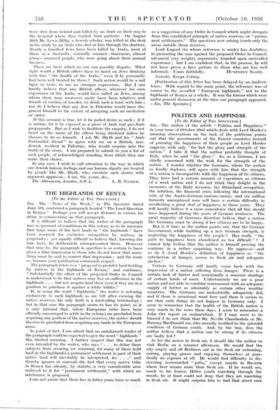THE HIGHLANDS OF KENYA
[To the Editor of THE SPECTATOR.] Sin,—The " News of the Week," in The Spectator dated June 5th, contained a paragraph headed " The Land Question in Kenya." Perhaps you will accept distance as excuse for delay in commenting on that paragraph.
It is difficult to believe that the writer of the paragraph was so ignorant of conditions in this colony as to be unaware that large areas of the best lands in " the highlands " have been reserved for exclusive occupation by natives, in perpetuity ; yet equally difficult to believe that, knowing the true facts, he deliberately misrepresented them. However that may be, the paragraph in question is so certain to have given a false impression to those who do not know that some- thing must be said to correct that impression ; and the more so, because your publication commands respect.
The paragraph refers to a " proposal to prohibit land-holding by natives in the highlands of Kenya," and continues, " Substantially the effect of the projected Order in Council is understood to be that natives may live on sufferance in the highlands . . but not acquire land there even if they are in a position to purchase it against a white bidder."
If, in using the word " highlands," the writer is referring exclusively to such highlands as are left after excising the native reserves, his only fault is a misleading terminology ; but in that case the paragraph seems to lose its point, as it is only rational that, where Europeans (who have been officially encouraged to settle in the colony) are precluded from acquiring any portion of the native reserves,. the native should likewise be precluded from acquiring any lands in the European areas.
, In point of fact, I am afraid that .no uninformed reader of the paragraph could be expected to give the word highlands " this limited meaning. I further suspect that this was not even intended by the writer, who says " . . . to debar these subjecti from securing (or retaining, for many of them hold land in the highlands) a permanent settlement in part of their native land will inevitably be interpreted, &R. . . .," and thereby ignores or conceals the fact that every native trihe in Kenya has already, by statute, a very considerable area reserved to it for " permanent settlement," with which no inteference is proposed.
I am not aware that there has in latter years been so much as a suggestion of any Order in Council which might derogate from this established principle of native reserves, or " perma- nent settlements." The questions now arising touch only the areas outside those reserves.
Lord Lugard (to whom reference is made) has doubtless, in presenting the case against the proposed Order in Council, advanced very weighty arguments, founded upon unrivalled experience ; but I am confident that, in the process, he will not have given a false picture to those who are less well
[Publication of this letter has been delayed by an inadver- tence. With regard to the main point, the reference was of course to the so-called " European highlands," not to the highlands of Kenya as a whole. It was the former which were under general discussion at the time our paragraph appeared. —ED. The Spectator.]




















































 Previous page
Previous page